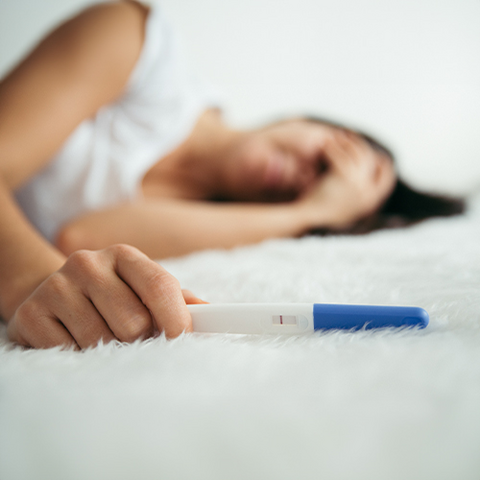Empty cart?
We can only assume that's because you haven't seen our latest offers
Sensilab uses cookies for their websites, which does not store personal data. Some cookies might already be installed. By proceeding to use this website you consent to the cookie usage.
Contact us online
100% satisfaction guarantee
Free delivery above €50
Contact us
info@sensilab.ieEarly menopause, which is the onset of menopause before the typical age range of 51 to 52, can be a significant and sometimes unexpected transition for women when it occurs before the age of 45. This condition, while natural, can present unique challenges when it happens earlier than anticipated, affecting women both physically and emotionally in ways that can feel isolating without the correct information and support.

Delving deeper into early menopause
When we talk about early menopause, we're referring to a woman's menstrual cycle coming to an end between the ages of 40 and 45. If this happens before the age of 40, it falls under the category of primary ovarian insufficiency (POI). The latter condition is not as rare as one might think, affecting about 3.5% of the female population. Whatever the case, it's important to note that the physiological changes associated with menopause can begin several years before menstruation stops entirely, so it's beneficial for women to be vigilant about the early signs.
The causes of early menopause can be multifaceted. In a significant number of cases, up to 90%, the exact cause may not be determined. However, there's a clear genetic link; if your mother or sister went through early menopause, the chances are higher that you might, too. Other causes include:
The symptoms of early menopause are mainly consistent with those experienced during natural menopause and can include:
If you're below 45 and experiencing menopausal symptoms, your GP may suggest blood tests to measure the level of follicle-stimulating hormone (FSH), which tends to increase as menopause approaches. By assessing your FSH levels, your GP can determine whether your symptoms are likely related to menopause. This test is usually repeated after four to six weeks and may be followed by other tests to determine whether your symptoms are probably related to menopause.
While early menopause cannot be reversed, its symptoms can be managed, the exception being if you wish to expand your family, in which case a specialist's assistance may be required.

Treatment often involves hormone replacement therapy (HRT) or the use of contraceptive pills to balance hormones and alleviate symptoms. These treatments also serve to reduce the risk of long-term health issues associated with early menopause, such as osteoporosis and cardiovascular disease.
Early or premature menopause is more than just an earlier end to menstruation. It can, in fact, have significant implications for your long-term health:
Osteoporosis: a condition characterised by brittle and thinning bones, which makes them more susceptible to fractures. Oestrogen plays a critical role in maintaining bone density, and its reduced levels during early menopause can lead to an increased risk of osteoporosis. For this reason, your GP may refer you to a DEXA scan to measure the strength of your bones and assess the risk of fractures.
Heart disease: oestrogen also contributes to cardiovascular health by regulating blood pressure and cholesterol levels and by preventing the accumulation of arterial plaques. With the onset of early menopause, the decrease in oestrogen can increase the risk of heart disease.
Fertility problems: early menopause can impact fertility, presenting challenges for those who wish to conceive. Fertility specialists can offer guidance and treatment options, such as in vitro fertilisation (IVF). For those who have planned ahead, the use of stored eggs may be a viable option.
Breast cancer risk: concerns about the relationship between early menopause, hormone replacement therapy (HRT), and breast cancer are quite common. However, research indicates that early menopause may be associated with a lower risk of breast cancer, and this risk may decrease further by maintaining a healthy weight.
The psychological impact of early menopause should not be underestimated. It can be particularly distressing for women who have not had the opportunity to have children or who have different plans for their reproductive years.
Studies have shown that women who enter menopause before the age of 40 often experience heightened levels of depression and stress, along with a decrease in self-esteem and overall life satisfaction, compared to those who transition into menopause in their early 50s. These emotional challenges are compounded by the common symptoms of menopause, which include mood fluctuations, anxiety, and stress, potentially exacerbating feelings of distress.
Given these challenges, getting the appropriate care and support is critical. Building a supportive network that includes friends, family, and health care professionals can help during this period.
In addition, reading about other women's experiences of early menopause can provide comfort and a sense of community. Beyond emotional support, it's important to prioritise self-care. A balanced diet, adequate sleep, regular physical activity, and effective stress management techniques can all contribute to better mood regulation and symptom management during this time.
Adopting certain lifestyle habits can significantly aid in managing the symptoms associated with early menopause. Here are just a few that can help:
Increase your vitamin D intake: vitamin D is essential for bone health, especially as early menopause increases the risk of osteoporosis. This vitamin aids in calcium absorption and supports healthy bone strength. Additionally, research suggests a correlation between low levels of vitamin D and an increased risk of depression and mood disorders.
Regular exercise: weight-bearing activities such as walking, weight training, dancing, aerobics, and swimming can help maintain bone strength and muscle function, alleviate joint pain, and reduce the risk of fractures. Exercise is also effective in reducing stress, anxiety, and depression, playing an essential role in decreasing the risk of cardiovascular disease.
Menopause-friendly diet and lifestyle: a balanced diet rich in nutrients can support hormonal balance and bone health. Physical activity should be a regular part of your lifestyle, and it's wise to cut down on alcohol consumption and quit smoking. Regular blood pressure monitoring is also advisable. These measures can help mitigate some of the potential health risks associated with early menopause.
Supplementation: for those seeking natural remedies to complement their lifestyle and medical treatments, supplements like our M-Pause offer a hormone-free option to help manage the symptoms of menopause. M-Pause is designed with 100% natural ingredients to reduce menopausal and perimenopausal symptoms, supporting women in their journey towards well-being!
By adopting these lifestyle habits, you can create a supportive environment for your body to navigate the changes brought on by early menopause, potentially reducing the severity of symptoms and improving your overall quality of life.
Products for you
Leaving already?
You’ve left [X] items in your cart.
We can’t guarantee the products will still be available when you return.
Check out now and get an EXTRA 10% OFF.
